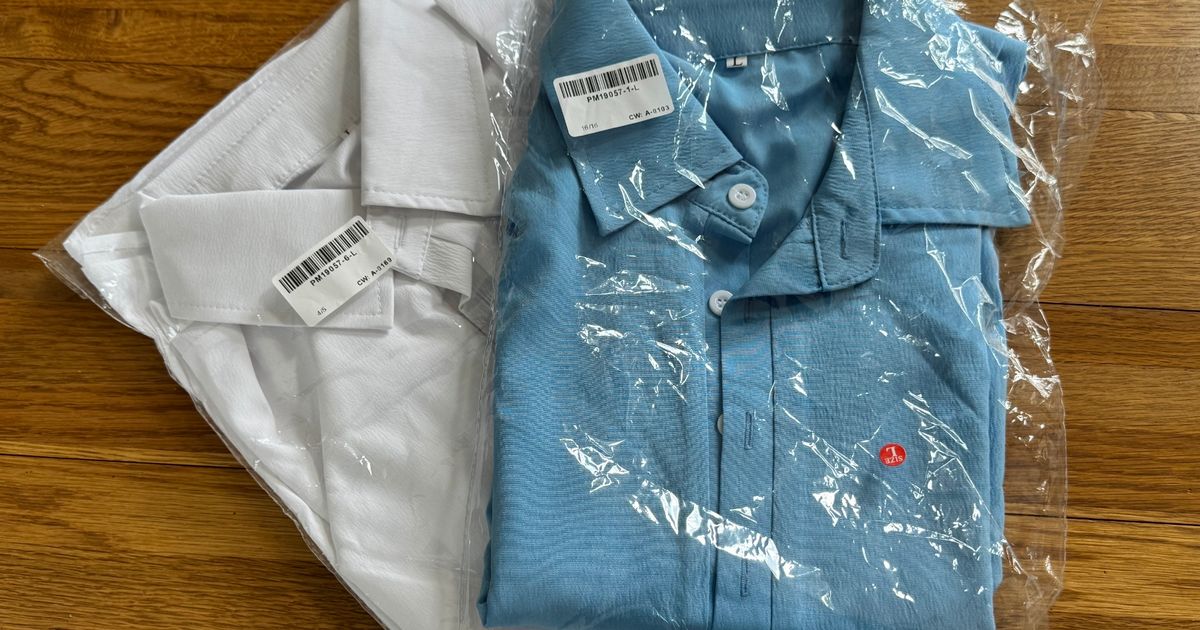In an unjust and unethical practice, shoppers are being stitched up by China-based fashion websites branded a ‘complete scam’. James Holt investigates. The ‘linen’ shirts which were actually made of polyester material(Image: Submitted)
The ‘linen’ shirts which were actually made of polyester material(Image: Submitted)
A luxury pair of ‘premium’ leather shoes and an authentic classic linen polo shirt. Shoppers who bought from online websites thought were nabbing a good deal on legitimate and quality boutique items from UK-based stores.
But instead, they took weeks to come and arrived in vastly different condition to how they were described online. The items, sold for a fraction of the price on the likes of Amazon and AliExpress, were instead poor quality and made from cheap fabrics.
Like many other online shoppers, they are being duped and left out of pocket by websites set up in China and shipping from huge warehouses. The stores, purporting to be UK-based and often closing down after ‘decades of successful years in business’, have instead been branded a ‘complete scam’ – on a global scale.
Join the Manchester Evening News WhatsApp group HERE
The Manchester Evening News has been investigating the surge in the online stores in recent weeks, all seemingly based in China, and found dozens of websites with the same site appearance and using stock photos of cheaply and mass-produced products to sell them at an inaccurately described, highly marked-up price for profit.
 Harper Manchester Facebook ads – which were later removed – used AI images
Harper Manchester Facebook ads – which were later removed – used AI images
AI-generated images are even used to create entirely false personas for the store’s owners – including an elderly couple and sisters who claimed to have run UK-based stores for almost 30 years before closing down.
The pages then advertise on the likes of Facebook and Instagram and embed false Trustpilot shopper reviews to appear more trustworthy and authentic.
 Fake Trustpilot reviews appear on websites
Fake Trustpilot reviews appear on websites
But customers are left trapped. They have told of their shock upon receiving the poor-quality goods, their agonising correspondence with the people behind the online websites and their reluctance to provide return addresses, often in the Zhejiang district some 6,000 miles away, which means returns come at a sky high price to the customer and without any guarantee that the refunds will actually be issued at all.
The M.E.N ordered a jumper from a website, claiming to be based in Manchester and closing down, which was shipped from China, took weeks to come and was of a much poorer quality and shape to how it had been advertised.
Re-using brand images and modelling photographs from garments worth just a few pounds, the stream of websites are continuing to appear to sell the items with a much higher price tag, all while deceptively advertising themselves to users who are often none the wiser.
Through investigations, the M.E.N has uncovered scores of sites that are known to be operating from large-scale warehouses in China and shipping to customers across the UK. Read here.
It is an unfair and unethical practice, that national trading standards teams and the UK government have received an increase in complaints about. Actions can be taken for breaches of protections under the Digital Markets, Competition and Consumers Act – but many of the websites are still continuing to operate brazenly online and advertising themselves on social media platforms.
“I could kick myself for falling for it”
Ian, from Sale, had been on King Street in Manchester and seen a shop with a pair of leather shoes he liked. Within a few hours, he was then served an advert on Facebook boasting a closing down sale for a store purporting to be based in Manchester city centre.
Harper Manchester, reported on extensively by the Manchester Evening News in recent weeks, claimed to have been run for almost three decades by loyal couple John and Alice Harper, on King Street.
Except it never actually existed.
 The Harper Manchester ad using a fake image of ‘John and Alice Harper'(Image: Manchester Evening News)
The Harper Manchester ad using a fake image of ‘John and Alice Harper'(Image: Manchester Evening News)
AI-generated images were created to appear authentic, and showed a cartoon-like elderly couple stood outside a shop quite obviously not on King Street, nor anywhere else in Manchester. The adverts were repeatedly appearing on Facebook feeds.
Manchester City Council previously confirmed that the Harper Manchester ‘store’ never operated in the city or was registered.
Thinking the advertisement looked legitimate, Ian found the Harper Manchester website was selling similar shoes to the ones he had seen during his visit to the city. Advertised as real leather, the brown boots were supposedly on sale due to the store ‘closing down’, slashed from £200 to £49.95. They were later slightly reduced again online.
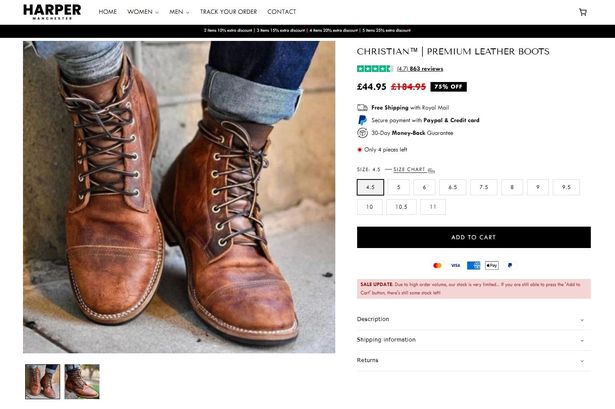 Ian chose to buy a pair of ‘leather’ boots on sale(Image: Submitted)
Ian chose to buy a pair of ‘leather’ boots on sale(Image: Submitted)
He placed an order after reading realistic-looking Trustpilot reviews on the foot of the website, many of which were five stars, and believed that the image on the website of the store appeared realistic at first glance. But they took weeks to arrive and, once outside of the box, were vastly different to how they had been advertised.
“I had been served an ad for this website, and it seemed a good price for the pair of leather shoes,” he said. “It seemed realistic at first, but I got a funny feeling early on.
“The website prompts you into thinking you are getting a good deal by encouraging you to add it to the basket before stock runs out. I checked they were leather and the right size, and ordered. Nothing at first indicated it would be coming from China or to suggest it wouldn’t be quick delivery.
“But it was too late. I was panicked and thought I’d been hacked. It gave me an uneasy feeling.”
Initially, Ian did not receive confirmation of the order or a notification the money had been taken out of his account, so froze his credit card. He quickly uncovered real Trustpilot reviews online, which branded the website a ‘scam’ and an ‘AI fake company to avoid’.
After a number of weeks, the shoes arrived and were made of ‘cheap plastic material’ and, although in a similar style to the shoe advertised, was not like for like or what Ian had intended on buying.
“The back design was different, the tongue is a one-piece which is stitched, and there is only single stitching on the sole,” Ian explained. “You could go to one of those cheap shoe shops and buy them for a tenner and be quite happy, but these were almost £50.
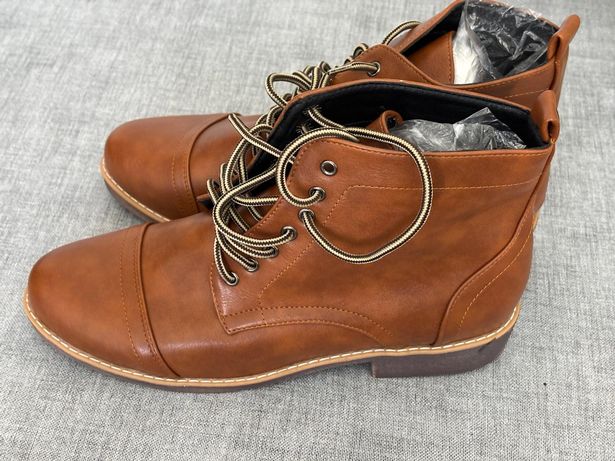 How the ‘plastic and cheap’ boots arrived(Image: Submitted)
How the ‘plastic and cheap’ boots arrived(Image: Submitted)
“They were nothing like they had been advertised. They’re selling it as a pair of premium leather shoes that you are convinced were originally £200. They are selling them under a guise.”
After contacting the firm, the Manchester Evening News has been shown a thread of emails between Ian and Harper Manchester, with correspondence from someone claiming to be ‘Alice’, one of the store’s elderly owners.
False stories about her ‘chatting with John’ were even conjured up, as attempts were repeatedly made to only offer him a partial refund of various amounts for him to keep the products and spend with them again.
Despite repeated reluctance to give the address to the Manchester store, one inaccurate email from the China-based firm read: “We’ve recently had to close our physical store and are now sending out the last of our remaining stock from our warehouse overseas, which has made things a bit trickier in terms of checking and matching every item perfectly.”
And after now receiving radio silence, Ian is awaiting a form to fill out a chargeback request through his bank. The address to return them to was listed again in Zhejiang, and would have to be funded by Ian.
“I would describe myself as fairly savvy, and could kick myself for falling for this,” he said. “But it came up on Facebook, seemed realistic and like the store I had seen in Manchester, so could’ve believed it was from somewhere in that vicinity.
“This is a whole new issue. I had no idea this existed until I fell for it. I never thought AI could be used to scam people and essentially set up fake websites. I know its not a massive amount of money, but nobody ever likes being had.”
“The public should be warned”
Roy Stones, from Bolton, saw a similar advert on social media. He was equally left duped and out of pocket after ordering from a site called Sara London clothing.
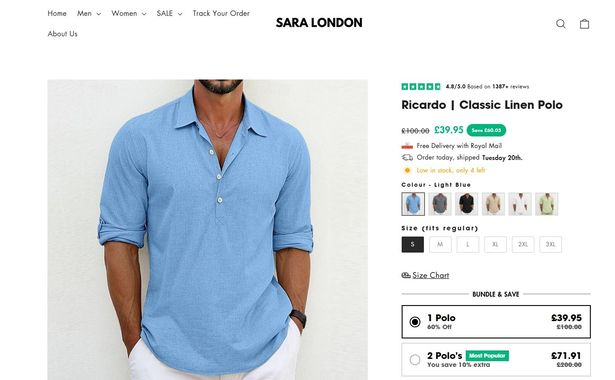 The linen shirts as advertised on Sara London
The linen shirts as advertised on Sara London
He said goods were ‘mis-described’, instead made of polyester, and that the website hosted a haul of fake reviews from shoppers that did not exist. Thinking he was buying boutique and quality items, he splashed £71 on two linen shirts, supposedly reduced from £200.
However a reverse image search linked to the product appeared to show the same shirt, along with the same product image, for sale on Amazon for just £4. The same shirt was also on sale for £29.95 on another website called Aubury London, with the same site build as Sara London, which also listed a returns address in China.
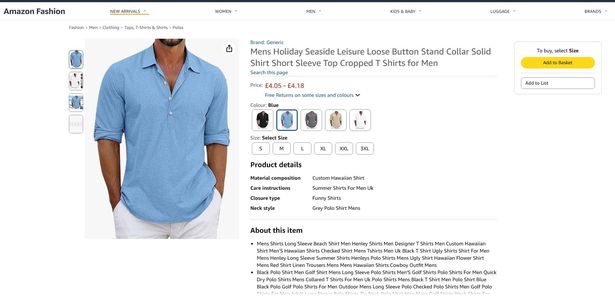 The same shirt was found on Amazon for a fraction of the price
The same shirt was found on Amazon for a fraction of the price
“I had seen the advert on Facebook, so I had a look at the page and it looked legitimate, with Trustpilot reviews and offering a 30-day money back guarantee on a top-quality linen shirt,” he said.
“The site implied they were in London with a location pin. I placed an order for two linen shirts in blue and white, which were on an offer for £71.91.
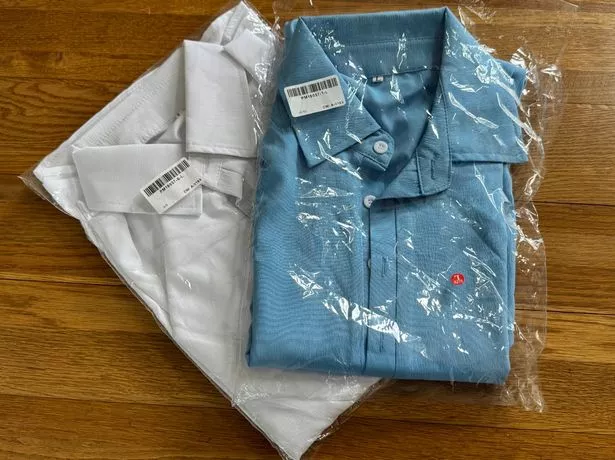 The blue and white shirts as they were delivered(Image: Submitted)
The blue and white shirts as they were delivered(Image: Submitted)
“It took a while, probably around three weeks or so before they arrived, which was when I realised that they weren’t coming from the UK. I went online to see what people were saying about it and then realised it was what it was.
“And sure enough they did arrive, but were not as described. They were made out of a synthetic polyester blend material and there were no labels in the garments. They looked and felt cheap.”
Roy immediately contacted the firm via email and told them he wanted to return them for a full refund, as per the clearly posted guarantee on the website.
But he quickly found that the products could not be insured through UK couriers due to lack of information being provided by the firm, and that he would have to pay up to £24 to ship them back. Repeated attempts were made by Sara London to offer him a partial refund, which he did not accept.
He has now received a temporary charge back for the full amount from his bank pending an investigation into the matter.
“There then followed an email chain, and the upshot is that without the company providing a destination telephone number I could not procure a UK courier,” he explained.
“It took six attempts before they sent me the return address which is in China. When I put the address in Google, it then warns that it’s a scam site.
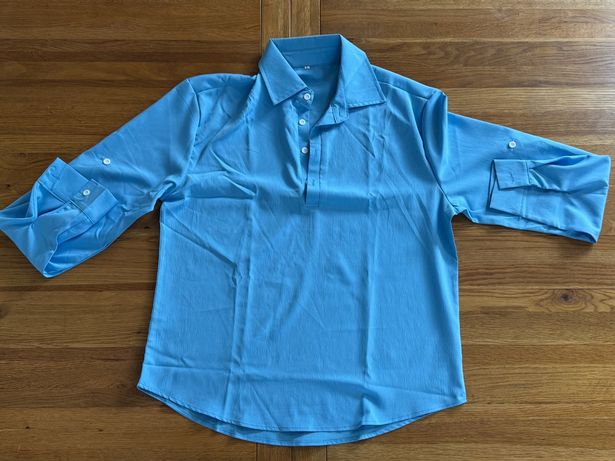 Roy tried to return the two shirts(Image: Submitted)
Roy tried to return the two shirts(Image: Submitted)
“The return address ZIP code provided, in China, was not recognised by Royal Mail. An internet search of the company would suggest they are mis-describing their goods and people then can’t get their money back.
“I have raised the issue with my credit card provider in an attempt to recover my money and reported the company to Meta. There are multiple companies operating this sharp practise and all linking back to return addresses in China, so I suspect it generates high revenues and the public should be warned.
“The worst thing really is that some people won’t have the time or the knowing of how to pursue this, but in my case I wasn’t going to let it go. Internet shopping is probably how most people shop now. You see a page that looks plausible, and think you can just send the items back, and that’s when they catch you.
“I know as an individual it’s small fry in terms of value, but not when you escalate it up to the number of people likely falling victim to this.”
The Manchester Evening News attempted to contact both Harper Manchester and Sara London for a comment but did not receive a response.
How can shoppers spot the signs and what protection is in place?
The UK Chartered Trading Standards Institute (CTSI) said it is ‘aware’ of consumer complaints ‘regarding businesses that make false or misleading claims online.
Shoppers are urged to not rely on reviews on the store websites and carry out thorough research elsewhere, be wary of unrealistically cheap deals, read product descriptions carefully and to keep all correspondence and documentation relating to purchases.
“CTSI is aware of consumer complaints regarding businesses that make false or misleading claims online Businesses that do so are likely to be in breach of the Digital Markets, Competition and Consumers Act 2024,” a spokesperson said. “Where reported, Trading Standards and partner organisations, such as the Competition and Markets Authority, will investigate and prosecute where appropriate to help protect consumers.”
 Shoppers can take steps to protect themselves(Image: Shared Content Unit)
Shoppers can take steps to protect themselves(Image: Shared Content Unit)
The Consumer Rights Act automatically gives certain rights to buyers. For example, goods must be ‘of satisfactory quality’ and ‘as described’. If goods supplied fail to satisfy these requirements, then the consumer has a right to cancel and receive a full refund. However, this may be difficult to enforce if the business is based abroad and is not willing to cooperate.
If consumers have paid using a debit card, they may be able to get compensation from their bank through a chargeback procedure. However this is not guaranteed, unlike if they have paid using a credit card and the price is £100 or more, in which case they have a Section 75 claim against their card provider, which is jointly liable for the consumer rights.
If the bank does not cooperate, consumer can complain to the Financial Ombudsman Service (FOS).
Currently, under the Consumer Rights Act, UK shoppers are entitled to a full refund if an item ordered online doesn’t match its description.
The Department for Business and Trade said that the Digital Markets, Competition and Consumers Act (DMCC) ‘prohibits commercial practices which through the provision of false or misleading information relating to a product or trader’ are likely to cause ‘the average consumer to make a different transactional decision they would not have taken otherwise’.
Even if based out of the UK, action can be taken against companies if they are directing marketing towards UK consumers. If enforcement, such as penalties, are unsuccessful, then further enforces can be applied for to have the sites taken down from UK web servers under the act.
A government spokesperson said: “These fake websites are a scourge for many consumers and companies. That’s why we’ve brought in new laws to help crack down on fraudsters who scam those looking for products online.
“These changes have given the Competition and Markets Authority and courts the powers to fine those fraudsters and crack down on rogue traders in the UK as well as extend powers to take down online content that harms consumers.”
On the issue of fake reviews, Trustpilot said they identify breaches of their guidelines and add consumer alerts to profiles to make shoppers aware.
“Some of our business plans offer official review widgets that companies can display on their websites, but this must be done through our platform to ensure content is not fabricated,” a spokesperson said. “We will continue to monitor all profiles and will take necessary action if the businesses do not adhere to our guidelines.
“Trustpilot is an example of many tools at a consumer’s disposal when they’re thinking about making a purchase. We recommend that consumers view a company’s Trustpilot profile directly to gain important insights – including any consumer warnings or alerts we may have applied – before engaging with them.”
